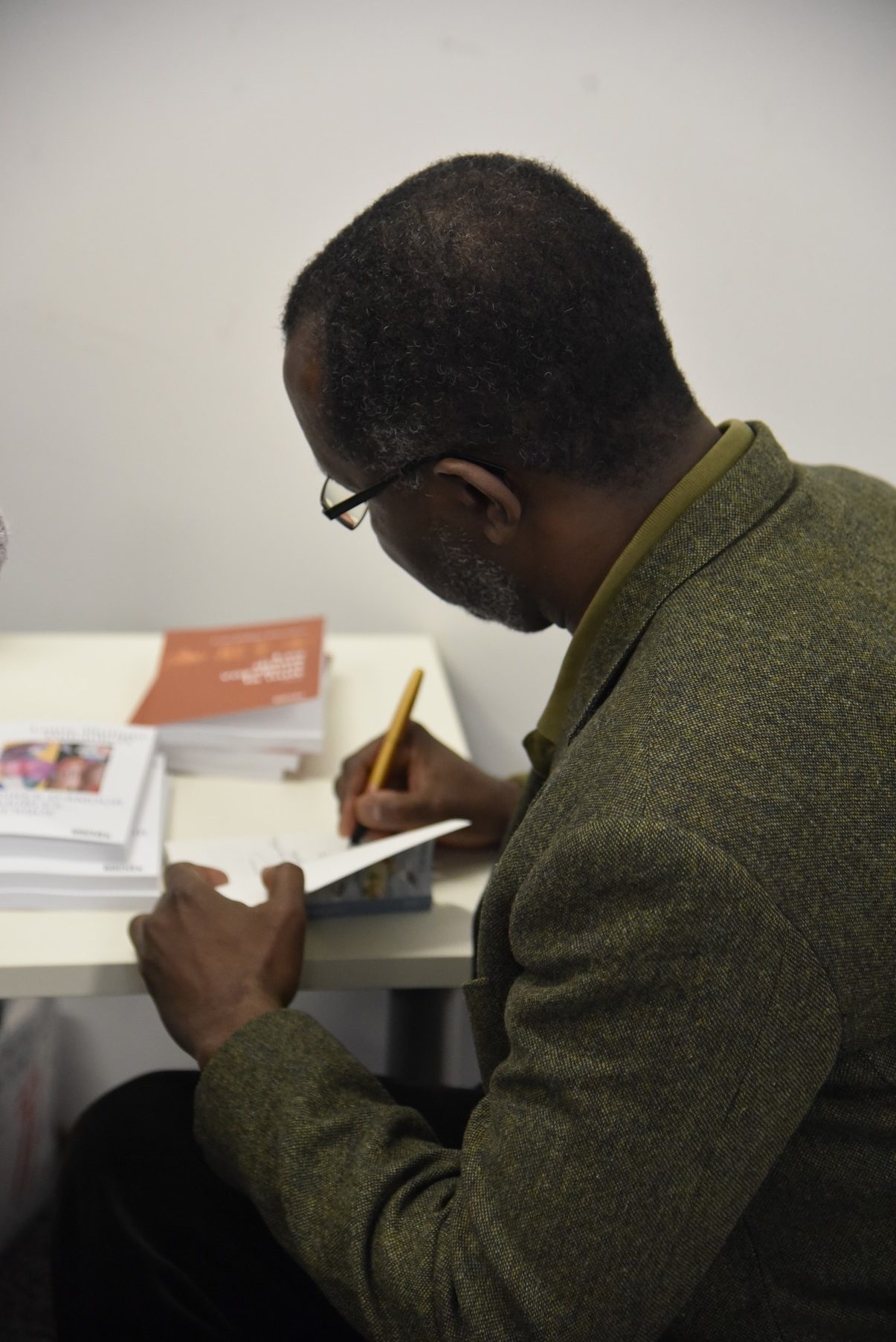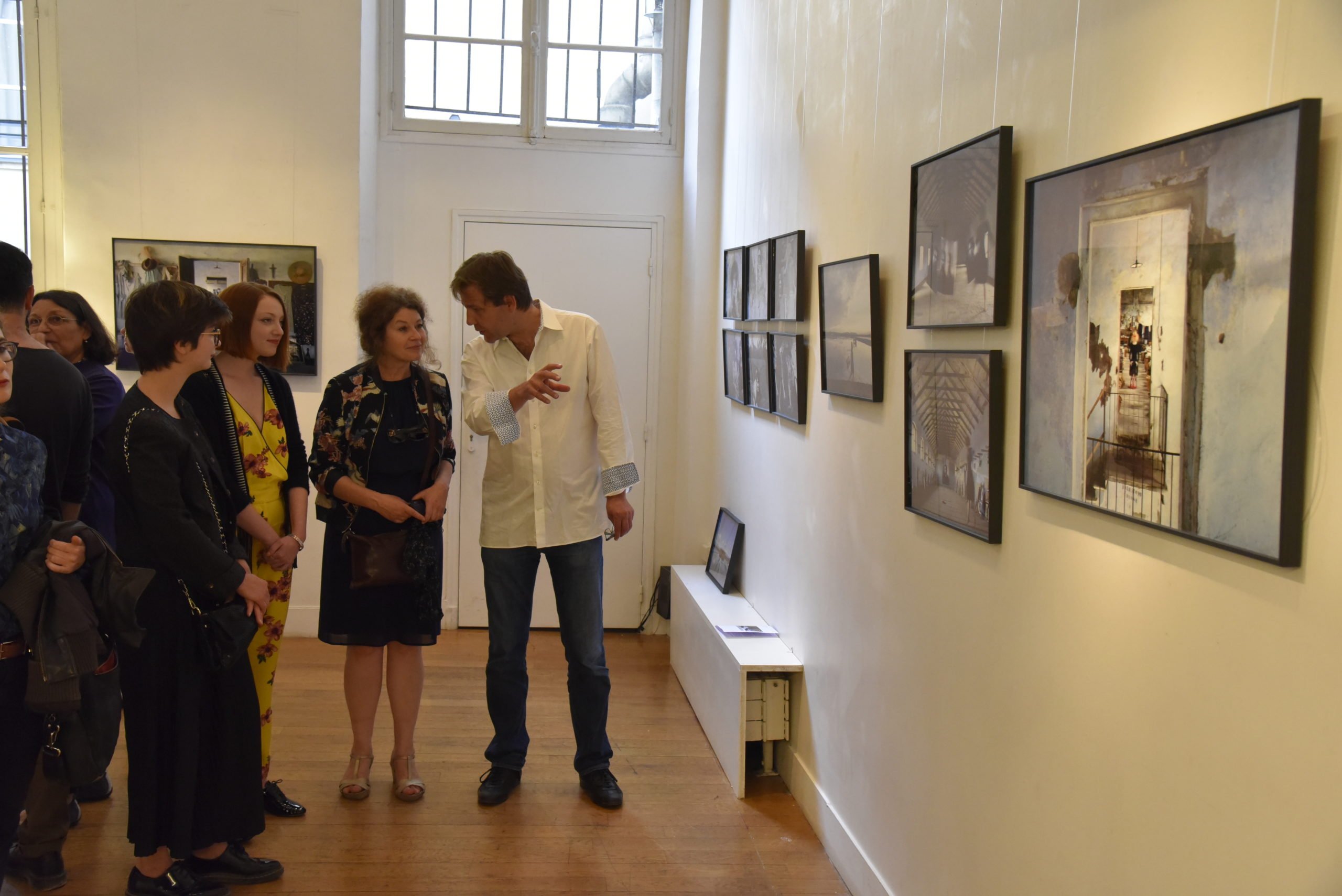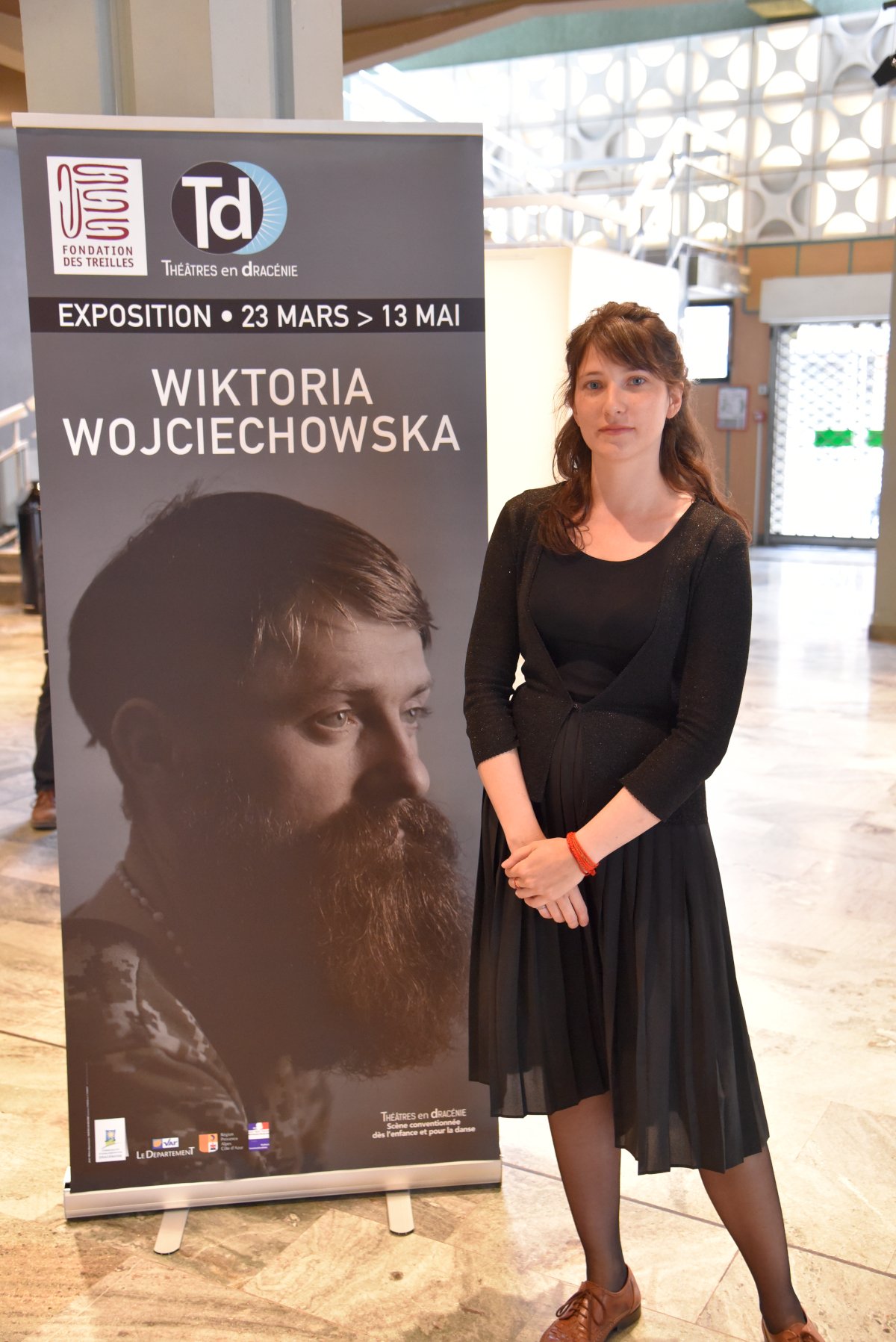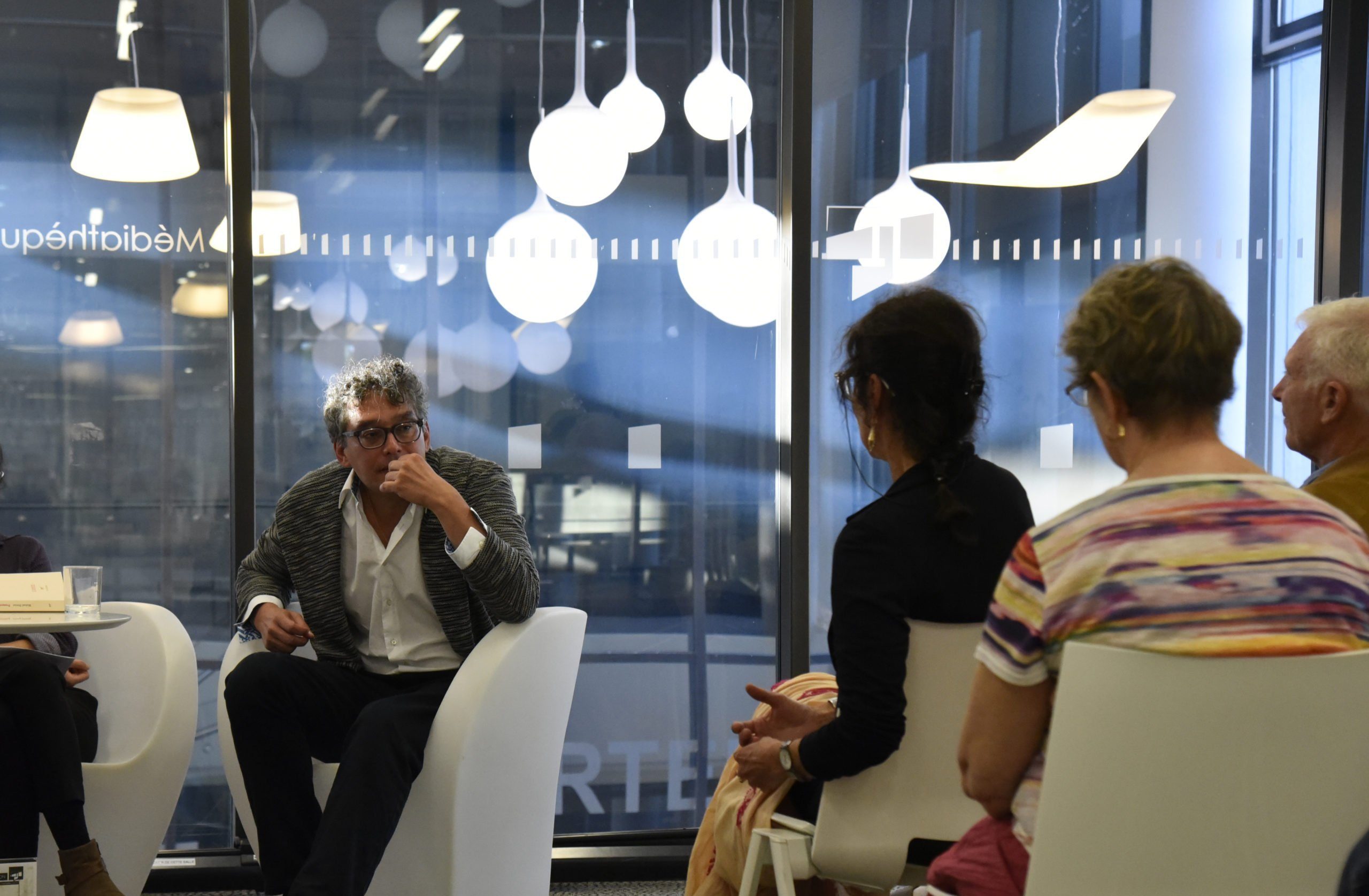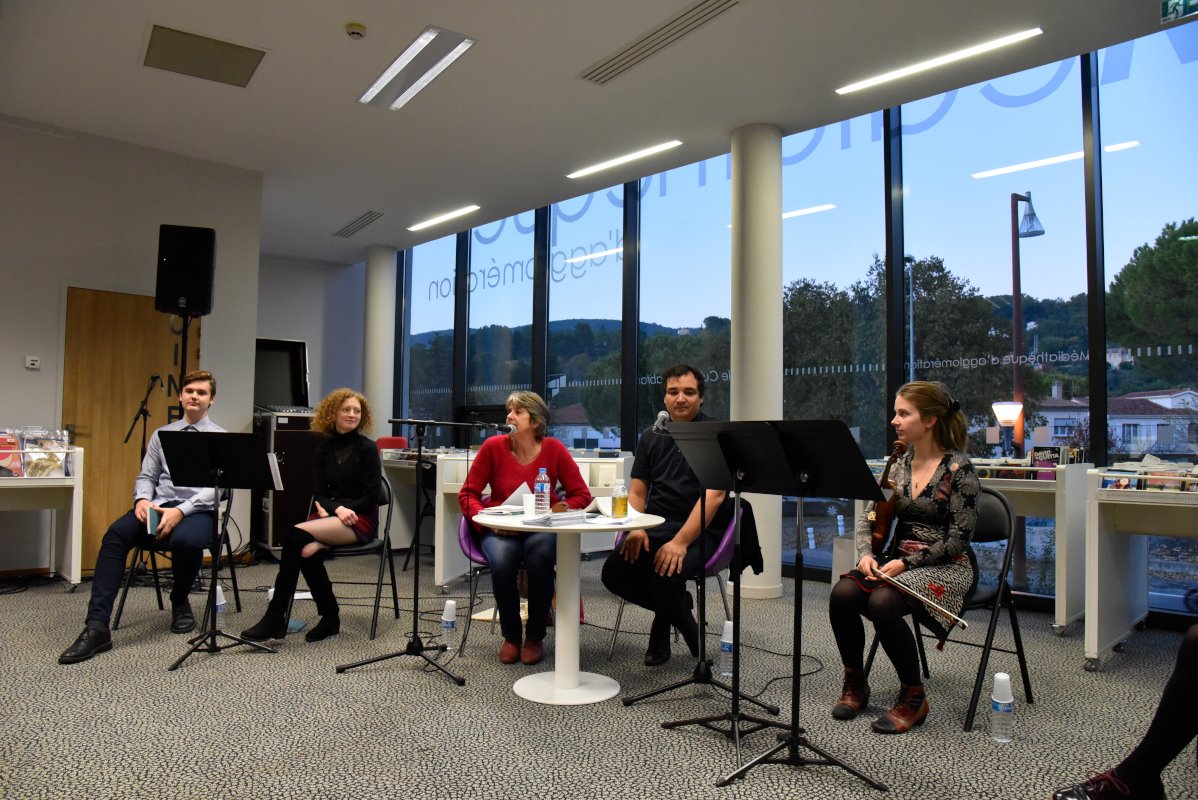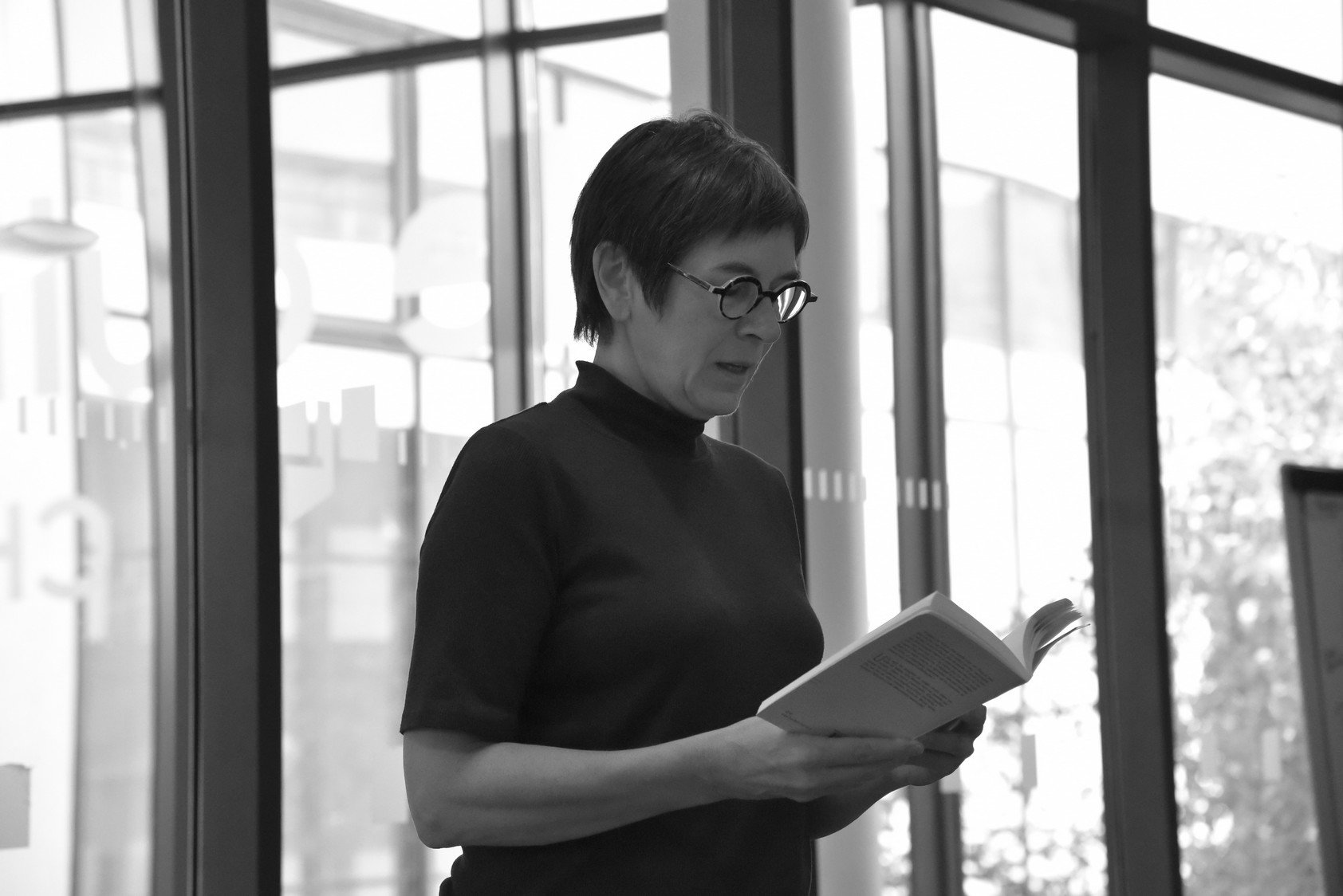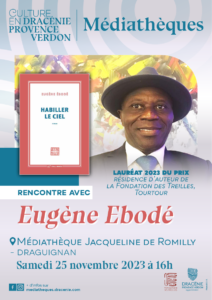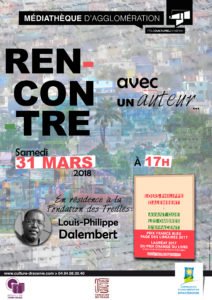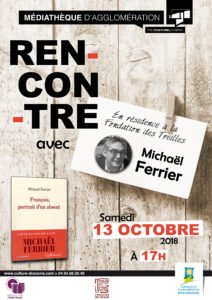The Treilles meetings
The Treilles meetings are intended to make more widely known the work of the Foundation in the fields of research and creation.
Plural meetings
Usually closed to the public, since 2017 the Fondation des Treilles has been regularly organizing, in partnership with public and private institutions, scientific and cultural meetings intended to share its activities.
Resulting from a collaboration with the media library of the Draguignan Chabran Cultural Centre (South of France), the project of meetings between writers and readers was born in 2018. The theme of these meetings revolves around a novel written by the author in residence at the Foundation. The writer shares a moment of reading with the public and, guided by a moderator, explains the creation process of his/her work.
During artistic meetings, our residents exhibit their works, and make the visitor discover their connections with art : mainly photography, but also painting, music or literature. They show to the public the work provided in residence and share the result of their inspiration.
Other multidisciplinary meetings are also organized, such as the one that took place at the Hôtel de Sauroy (Paris) in 2018, where researchers who stayed at Les Treilles, artists in residence, opera singers from the Master Class and contributors to the Foundation met the public in order to discuss the Foundation’s various missions and fields of intervention in the cultural field.
Cécile A. Holdban
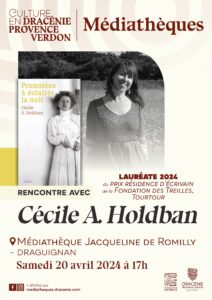
Late in the afternoon of Saturday, April 20, a lovely crowd awaited our author in the reading room, on the first floor of the Jacqueline de Romilly Media Library in Draguignan. Moderated by Alexia Aubert, this meeting allowed Cécile to retrace her journey and the reasons which pushed her to write her book Premières à éclairer la nuit (First to light the night), published by Arléa. In this book, she imagines fifteen letters from 20th century poets, women with extraordinary destinies who, like her, are driven by writing and a love of poetry.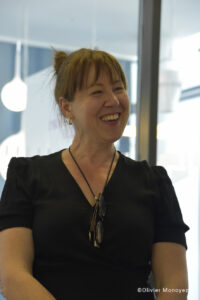
Cécile’s family history was marked by the exile of her Hungarian grandparents in the 1940s. During the meeting, she recounted to her audience the importance and influence of her Hungarian mother tongue in her literary and artistic imagination. She also spoke of her passion for poetry and painting, which are the two pillars of her creativity. Cécile read several extracts from Premières à éclairer la nuit and from her collection of poetry Poèmes d’après (Poems after), published by Arfuyen. At the end of the meeting, a book sale and a signing session took place, followed by an interview by RCF radio.
Maryvonne de Saint Pulgent
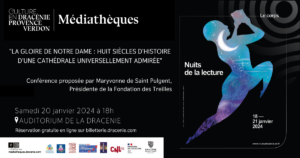
As part of the “Nuits de la lecture” (reading nights), Maryvonne De Saint Pulgent, renowned essayist, and President of the Fondation des Treilles hosted a conference entitled :
The Glory of Notre-Dame: 8 centuries of history of a universally admired cathedral.
On the occasion of this conference, she unveiled her book The Glory of Notre-Dame: faith and power, published by Gallimard editions in December 2023. This book, very erudite, accessible and richly illustrated, revisits the thousand-year-old history of a Cathedral, which has always been most admired. The fire of the Cathedral ultimately enriched its legend and raises questions about the sources of its fame, while this immutable planetary glory is now set up with the crown of martyrdom.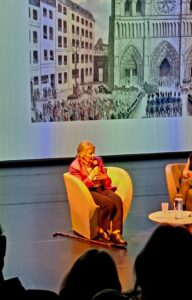
This conference was moderated by Marie-Paule Vial, art historian and curator of the Fondation des Treilles collections.
An eminent French intellectual personality, Maryvonne de Saint Pulgent has left her mark on the cultural field. She began her career in 1976 as an advisor to the Paris administrative court. Honorary section president at the Council of State, she was Director of Heritage at the Ministry of Culture between 1993 and 1997.
Her time in this position was the occasion for reflection on French cultural policy presented in Le gouvernement de la Culture/The government of Culture (Gallimard, 1999) and Culture et communication: les missions d’un grand ministère/ Culture and communication: the missions of a large ministry (Gallimard, 2009).
Her contribution also extends to the Presidency of the Fondation des Treilles since 2004, testifying to her unwavering commitment to the promotion and preservation of cultural heritage. At the end of the conference, she dedicated her book to her listeners.
Dimitri Bortnikov, Garance Meillon, Sami Tchak
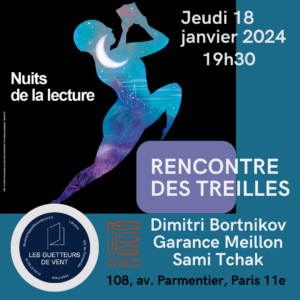 On the occasion of the 2024 Reading Nights, the foundation had the pleasure of organizing a meeting in Paris with the winners of the Author’s Residency Prize: Dimitri Bortnikov, Garance Meillon (2021 winners) and Sami Tchak (winner 2010).
On the occasion of the 2024 Reading Nights, the foundation had the pleasure of organizing a meeting in Paris with the winners of the Author’s Residency Prize: Dimitri Bortnikov, Garance Meillon (2021 winners) and Sami Tchak (winner 2010).
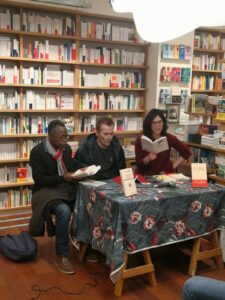 On January 18, at the “Guetteurs de Vent” bookstore in Paris, the attendees met for a moment of reading and discussion with our laureates around a selection of their texts, resonating with the theme of this reading nights edition : the body.
On January 18, at the “Guetteurs de Vent” bookstore in Paris, the attendees met for a moment of reading and discussion with our laureates around a selection of their texts, resonating with the theme of this reading nights edition : the body.
They respectively read passages from their latest novel:
– L’aigle et le cygne / The eagle and the swan, by Dimitri Bortnikov (Odyssée editions).
– La Langue de l’ennemi / The language of the enemy, Garance Meillon (Gallimard).
– Ainsi parlait mon père / Thus spoke my father, Sami Tchak (JC Lattès).
The evening ended with a signing session.
Eugène Ebodé
Last Saturday, November 25, our author in residence, Eugène Ebodé, met the public of Draguignan during a reading at the Jacqueline de Romilly Media Library.
Eugène Ébodé was born in 1962 in Douala, Cameroon. He is currently administrator of the chair of African literatures and arts at the Academy of the Kingdom of Morocco and professor at Lansana Conté University in Sonfonia, Guinea.
His novels present a diversity of territories, continents and themes, the main titles of which are: La Transmission (Gallimard, 2002, folio 2020), La Divine Colère/ Divine anger (Gallimard, 2004), Silikani (Gallimard 2006), Le Fouettateur (Vents d’ailleurs, 2006), Métisse palissade/ mixed race fence (Gallimard 2012), Souveraine Magnifique/ Magnificent Sovereign (Gallimard 2014), La rose dans le bus jaune/ The Rose in the yellow bus (folio Gallimard, 2016), Le balcon de Dieu/ The Balcony of God (Gallimard, 2019), Brûlant était le regard de Picasso / Burning was the gaze of Picasso (Gallimard, 2021).
During the meeting, he spoke about his latest book “Habiller le ciel/Dressing up the Sky”, published by Gallimard (2022). This book is intended to be a literary compensation for the absence of the son at his mother’s funeral. He evokes the maternal figure and the power and poetry of his writing are very powerful in this novel. He gives voice and body to the one who invited him “to dress up the sky” with prayers to divert furious storms from his path. He also read passages from his storybook “Grandfather Ouidi in the Sahel”, published by Africamoude. His contagious good humor and natural joviality made this reading moment, punctuated by laughter and friendly exchanges with the public, a very pleasant moment.
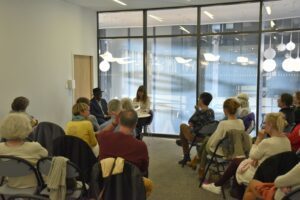
Presentation of André Gide and his swiss editor : Correspondence with Richard Heyd (1930-1950) at the Swiss Embassy in France
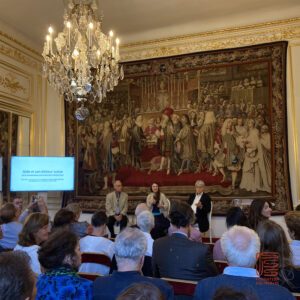
@Fondation des Treilles
On the occasion of the publication of the second volume of the Inédits des Treilles devoted to the correspondence between André Gide and Richard Heyd, the Swiss Embassy in France, the Catherine Gide Foundation and the Fondation des Treilles organized an evening on September 19 in the premises of the embassy. After a discussion with Pierre Masson and Peter Schnyder, editors of the book, and moderated by Marie Frisson, Franck Javourez read extracts from Gide’s Journal relating to Switzerland, accompanied by Katia Viel, violinist, and Cécile Vérolles, cellist.
Carine Fernandez
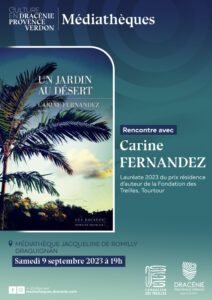
On September 9, Carine Fernandez, 2023 winner of the author residency, went to meet her readers at the Jacqueline de Romilly media library in Draguignan. This was an opportunity to present her work and in particular her latest novel “Un jardin au désert” (A garden in the desert), published by the Escales edition in 2019.
Between the palm groves and skyscrapers, Carine Fernandez draws a fresco of four generations, that of the members of the Bahahmar family, linked by blood, money and secrecy. She also tells us about a Saudi Arabia in constant turmoil where women are stubbornly knocking on the door of independence.
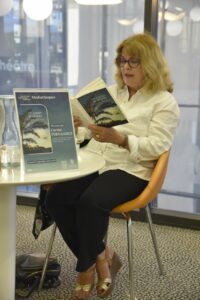 Her lyrical, picaresque writing, in which her experiences in this desert country shine through, happily takes us on a journey to the East, through the tribulations of her characters.
Her lyrical, picaresque writing, in which her experiences in this desert country shine through, happily takes us on a journey to the East, through the tribulations of her characters.
Born in the Lyon region to a Spanish republican father, a political refugee, she will in turn see her path marked by exile. She spent more than twenty years living abroad in Egypt, Lebanon, Saudi Arabia and the United States, while continuing her studies in literature remotely with the University of Lyon II.
Back in France, she began to publish academic reviews and literary texts. Her first novel, “The Abyssinian Servant” (Actes Sud 2003), is a picaresque novel set against the backdrop of the Saudi society. She then published two other novels with Actes Sud: “The Cairo Comedy” and “The Red Season”. She published a collection of short stories, “Le châtiment des goyaves” (the guavas punishment), published by Dialogues, then a short committed story on the rise of small violent far-right groups, “Identités barbares”, published by J.C. Lattès.
Clément Chapillon : photography exhibition
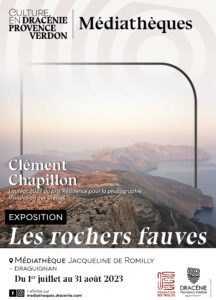
Clément Chapillon is the winner of the 2018 Photography Prize. In “Les Roches Fauves” (the tan rocks), he questions the notion of geographical and mental isolation through an island space in the Aegean Sea. If the word isolated literally means “shaped like an island”, we can rightly wonder what form time, other people, beliefs and imagination take in this finite world bordered by infinity.
For around twenty years, Clément Chapillon has regularly visited the island of Amorgos, located in the heart of the Greek Cyclades archipelago. With his Plaubel Makina 67 (medium format film camera), he created a story in images that is both documentary and metaphorical on the contradictory feelings caused by the insularity of this rocky, arid and wild territory. The series takes its name from a passage from “The Greek history” by the French archaeologist and writer Gaston Deschamps, published in 1892 and part of the work of which is devoted to Amorgos.

©Olivier Monoyez
Moviment in the Pompidou Centre in Paris

©Hervé Véronèse, Centre Pompidou
From July 12 to 14, the Fondation des Treilles was invited for the 10th and final chapter of Moviment organized by the Georges Pompidou Centre. Works by artists common to both collections were highlighted, notably Max Ernst, Victor Brauner and Takis, emblematic artists of the Fondation des Treilles collections. Visitors also discovered a selection of photographs of the winners of the first 10 years of the Residency Prize for Photography.
The foundation’s activities were also presented through the screening of films, photos, and testimonies from people who worked or stayed at the Foundation.
The Arles photographic meetings – from 4 to 8 July 2023
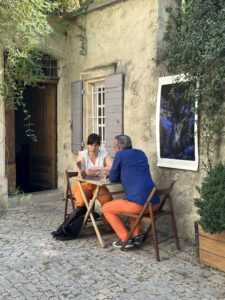
For the third year in a row, the foundation opened its “maison des Treilles” in Arles. Portfolio readings and meetings with the winners of the foundation’s photographic prize were on the program for this new edition. The Rencontres d’Arles is a festival dedicated to photography, the largest of its kind in France with more than 100,000 visitors per edition. From beginning of July till end of September, around forty exhibitions created by the most renowned photographers on the planet can be discovered throughout the city.
Presentation of Civilisations at the Quai Branly – Jacques Chirac museum
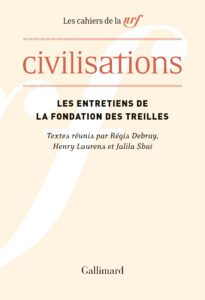 On the occasion of the publication of the proceedings of the seminar under the title Civilizations in the Entretiens des Treilles series at Gallimard, a meeting was organized on June 27, 2023 in the Jacques Kerchache reading room of the Musée du Quai Branly – Jacques Chirac. You can listen to the entire meeting in which Marcel Benabou, Régis Debray, Henry Laurens, Jean-Noël Robert, Maryvonne de Saint Pulgent and Pierre Singaravélou participated in the foundation’s research blog.
On the occasion of the publication of the proceedings of the seminar under the title Civilizations in the Entretiens des Treilles series at Gallimard, a meeting was organized on June 27, 2023 in the Jacques Kerchache reading room of the Musée du Quai Branly – Jacques Chirac. You can listen to the entire meeting in which Marcel Benabou, Régis Debray, Henry Laurens, Jean-Noël Robert, Maryvonne de Saint Pulgent and Pierre Singaravélou participated in the foundation’s research blog.
Young researcher Prize 2023
Presentation of the Young Researcher Prize 2023 On June 5, the Fondation des Treilles organized for the first time a ceremony to award the Young Researcher Prize at the Institute of Advanced Studies in Paris. On this occasion, Saadi Lahlou, director of the IEA and Pascal Ory, president of the Scientific Council of the Fondation des Treilles debated on the interest and complementarity of disciplinary and interdisciplinary research residencies.
Sylvie Doizelet
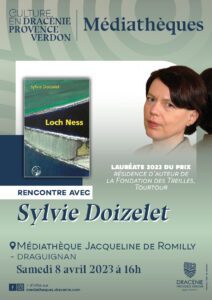
Born in Lyon in 1959, she then lived for a few years between London, Lyon and Paris. She moved to Paris in 1981, following her meeting with Raphaële George and Jean-Louis Giovannoni (“Les Cahiers du Double”). Twenty years later, in 2001, she left Paris for the Aude region, Arbois, La Panne, Bonfol, Beurnevésin in Aube, and now lives in Boulogne-sur-Mer.
In 1992, she published her first novel Chercher sa demeure (looking for home) (ed. Gallimard), and since then has alternated the publication of novels and portraits (Sylvia Plath, Rodenbach, Thomas de Quincey, Ruusbroeck, Kubin, Moore, Barlach, Kollwitz… ), as well as translations (Ruth Rendell, Ted Hughes, Joyce, Laura Kasischke…) She is currently working on a portrait of John Cowper Powys.
During her meeting with the public of the Draguignan media library, Sylvie Doizelet read passages from her latest book Loch Ness, published by Karbel editions. She shared with her audience her passion for Scotland’s most famous Loch and the impressive library she has on the subject. In her book, she tackles the subject of “Nessie” enthusiasts who settle on the edge of the Loch and daily stalk its dark waters in the hope of catching a glimpse of the hidden monster. Her writing transcribes both the mystery and the magic of the place. The “Lodge” inn and its six adjoining cottages. Residents of today, troubled by those of yesterday. John, who lives in both worlds simultaneously. Dunn, the investigator who dialogues with himself. And the shadows, which slip from one cottage to another. In her novel, Sylvie brilliantly mixes legends and investigations while breathing a mysterious wind into the plot that keeps the reader in suspense until the end.
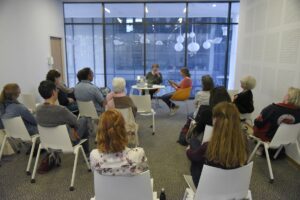
Beata Umubyeyi Mairesse
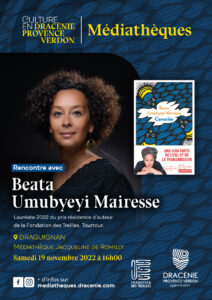 Beata was born in Butare, Rwanda, in 1979. She arrived in France in 1994 after surviving the genocide of the Tutsi. A graduate in political science, she worked for 15 years as a coordinator of health projects, in France and abroad, then entered literature late in life. She first published short stories, Ejo, followed by Lézardes and other short stories, winners of numerous literary prizes (Éd.Autrement). Her first novel Tous tes enfants dispersés (All of your children dispersed), published in 2019, won the Ethiophile Prize, the Roots and Words Prize, the Marque-Page Prize and the Five Continents of “La Francophonie” Prize (Éd. Autre & J’ai Lu). She has also published a collection of prose poems: After Progress. During her meeting with the public of Draguignan on Saturday November 19, Beata spoke about her latest novel, Consolée, published by Autrement éditions. She also explained the genesis of her first novel, Tous tes enfants dispersés (All of your children dispersed), published by the same editor.
Beata was born in Butare, Rwanda, in 1979. She arrived in France in 1994 after surviving the genocide of the Tutsi. A graduate in political science, she worked for 15 years as a coordinator of health projects, in France and abroad, then entered literature late in life. She first published short stories, Ejo, followed by Lézardes and other short stories, winners of numerous literary prizes (Éd.Autrement). Her first novel Tous tes enfants dispersés (All of your children dispersed), published in 2019, won the Ethiophile Prize, the Roots and Words Prize, the Marque-Page Prize and the Five Continents of “La Francophonie” Prize (Éd. Autre & J’ai Lu). She has also published a collection of prose poems: After Progress. During her meeting with the public of Draguignan on Saturday November 19, Beata spoke about her latest novel, Consolée, published by Autrement éditions. She also explained the genesis of her first novel, Tous tes enfants dispersés (All of your children dispersed), published by the same editor.
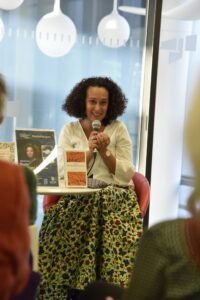
During her meeting with the public of Draguignan on Saturday November 19, Beata spoke about her latest novel, Consolée, published by Autrement. She also explained the genesis of her first novel, Tous tes enfants dispersés (All of your children dispersed), published by the same publisher.
“Tous tes enfants dispersés (All of your children dispersed) is a family story over three generations that explores themes that I think will perhaps accompany me all my life, which are the themes of transmission, in particular inter-generational transmission, questions of interbreeding, and language issues, since it is a family that is mixed, between France and Rwanda, that it is a family that can no longer speak to each other for various reasons. In general, silences in families are woven from many things, and in this case there is the absence of peers, there is the genocide against the Tutsi, there is geographical distance, there is the exile. The whole challenge of this novel for me was to get the family members to talk to each other again. And it will take a third generation finally, as often; a grandson, so that mother and daughter can talk to each other again”.
François-Henri Désérable
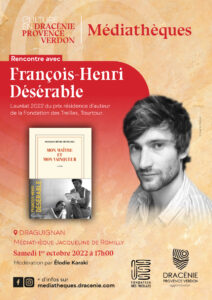
While leading a career as a professional ice hockey player, François-Henri Désérable began writing at the age of eighteen, and at the age of twenty-five published his first book with Gallimard editions: Tu montreras ma tête au peuple (You will show my head to the people), who won several literary prizes including that of La Vocation. This will be followed by Évariste, a fictionalized biography of the genius of mathematics Évariste Galois, considered by the magazine Lire as the French revelation of the year 2015, and Un certain M. Piekielny (2017), an investigation into the traces of a character evoked by Romain Gary in La Promesse de l’aube (The promise of dawn). In September 2021, Mon maître et mon vainqueur (My master and my winner) is published by Gallimard.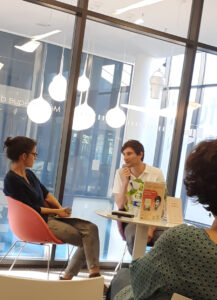
During his meeting with the public of Draguignan on Saturday October 1, François-Henri talked about his latest book, My master and my winner.
« The notebook was the first thing the judge showed me when I entered his office earlier. Under the flexible and transparent cover, one could read in black marker: MY MASTER AND MY WINNER.
On the following pages there were poems. This is what we had found on Vasco: the revolver, a notebook blackened with about twenty poems and, later, after ballistics expertise, powder residue on his hands. This is what was left, I thought, of his love story. »
Before, of course, discussing the plot of his next story in the footsteps of Che Guevara, a project for which he won The Author’s Residency Prize.
…the public at the Arles photographic meetings – from July 5 – 9.
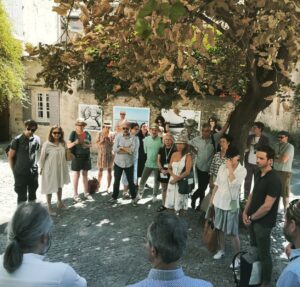
Appointments and exhibitions animated “the maison des Treilles” located in the heart of the old town and open to the public. Some laureates presented the projects carried out during their residency, others their new achievements. In addition to the scheduled events, the place has made it possible to exhibit the work of the 2021 winners, to encourage new encounters and other projects.
This second edition was also an opportunity for Maryvonne de Saint Pulgent, President of the Foundation, to conclude a partnership with the Escourbiac printing company, for the creation of the Escourbiac – Fondation des Treilles Prize.
Geneviève Parot
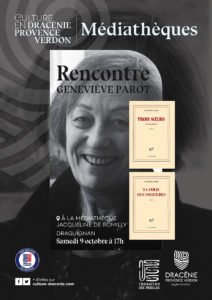
Geneviève Parot, in writing residency for three months at the Fondation des Treilles, participated in a meeting hosted by Élodie Karaki at the Jacqueline de Romilly media library in Draguignan on October 9, 2021.
First through the theater and the radio, Geneviève Parot had her first contact with writing through the writing of scripts, songs and the adaptation of texts such as La porteuse de pain (the bread carrier) by Xavier de Montépin. Then, in 2005, her first novel Trois sœurs, a long silence (three sisters, a long silence), appeared followed in 2009 by La folie des solitudes, both published by Gallimard.
In her first book, Geneviève Parot tells the story of three sisters, Simone, Marie and Marthe, in “a fascinating journey through the 20th century, described with precision and economy” (Josyane Savigneau, Le Monde des Livres, May 12, 2005) “I remember him drawing a circle on the board and asking us to follow the line. You could never find the end of it, of course, and that was eternity. Spinning endlessly in circles on his steps, like a donkey with a noria. I did not like that idea. And even today it frightens me, with its human logic. I do not believe it. I prefer to imagine myself eternity like a line which starts from death and which climbs, which rises through the air, exceeds the birds, the clouds […], escapes the attraction of the earth, arrives where the sky resembles night, and continues to go, very far, between the planets and the stars, without end. “
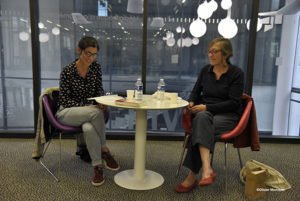
For her second novel, La folie des solitudes, Geneviève Parot is freely inspired by a news item about parricide that occurred in her Creuse region in the 1920s. Then, Geneviève Parot and Élodie Karaki discussed themes dear to the author: the secret heritage transmitted from one generation to the next, the desire for commitment and its disillusions, the inscription of individual destinies in the “History with his big ax” (to use Georges Perec’s expression), but also on the question of genre: short story and novel, and the distinction between black literature and white literature, which our author puts into perspective. Before, of course, discussing the plot of her next story, a project for which she received the Author’s Residency prize.
…the public of the Arles photographic meetings – from July 6 to 10, 2021.
Meetings and exhibitions animated “the house of Treilles” located in the heart of the old town.
Open to the public, the “Maison des Treilles” was taken over by the winners of the Photography Prize. Some presented the project carried out during their residency, others, their new achievements.
In addition to the scheduled events, the place allowed to exhibit the work of the 2019/2020 laureates, to encourage new encounters and to imagine other projects.
This first edition was also an opportunity for Maryvonne de Saint Pulgent, President of the Foundation, to congratulate Laura Serani, who chaired the jury for 7 years, for her remarkable work, and to present its new members and Jean-Luc Monterosso, who succeeds her.
Access here to the program of the 2021 edition
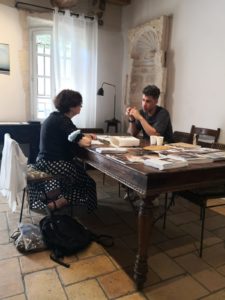
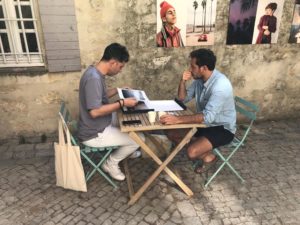
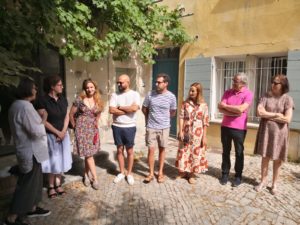
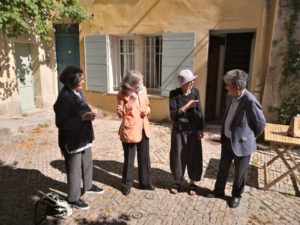
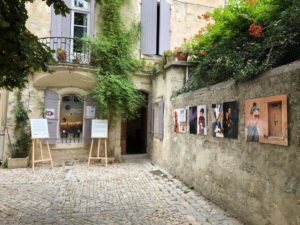
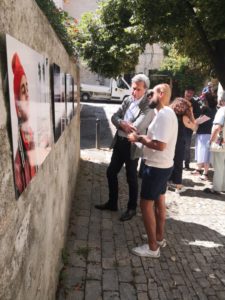
Garance Meillon
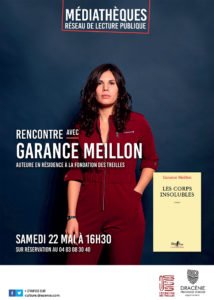
On Saturday May 22, a literary meeting with Garance Meillon, 2021 laureate of the Author’s Residency Prize, currently in residence at the Fondation des Treilles, took place at the Draguignan Media Library. During this reading hosted by Marion Couraleau, Head of the Adult Pole of the Public Reading Network, our author spoke about her career as a writer, punctuating her story with numerous readings of extracts from the three novels that make up her work: phantom pain, a normal family (Fayard Editions), insoluble bodies (Gallimard editions).
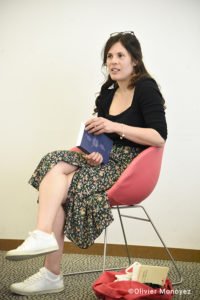 In her latest novel, Insoluble Bodies, the two main characters, Frederick and Alice, should never have met. The first, from a modest family, spent a painful childhood in the 1970s, between the building bars of his city, the daily beatings of his father, and soon drugs. The second only dreams of dancing and flees the conformism of her bourgeois Dijon family to escape to Paris, in the renewed pursuit of an existence off the beaten track.
In her latest novel, Insoluble Bodies, the two main characters, Frederick and Alice, should never have met. The first, from a modest family, spent a painful childhood in the 1970s, between the building bars of his city, the daily beatings of his father, and soon drugs. The second only dreams of dancing and flees the conformism of her bourgeois Dijon family to escape to Paris, in the renewed pursuit of an existence off the beaten track.
But, one evening in 1983, Alice ran into Frédéric. She saves him from his dangerous slope, while he offers her the possibility of a special love. These insoluble bodies, for a time, will merge together.
Throughout her novel, Garance Meillon explores the incandescent trajectories of two characters separated by everything, each chapter echoing the previous one, and paints the portrait of a love against a backdrop of the 80s, between pink neon lights and black leather jackets.
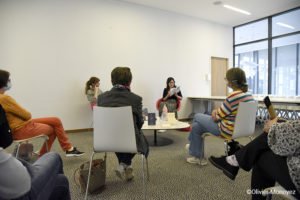
« André Gide and the painters » : round table and visit of the collections
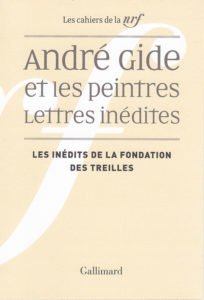 This meeting was organized for the launch of “André Gide and the painters. Unreleased letters“, a book edited by Pierre Masson and Olivier Monoyez with the collaboration of Geneviève Masson at Gallimard publisher (Unpublished works from the Fondation des Treilles, collection the NRF notebooks).
This meeting was organized for the launch of “André Gide and the painters. Unreleased letters“, a book edited by Pierre Masson and Olivier Monoyez with the collaboration of Geneviève Masson at Gallimard publisher (Unpublished works from the Fondation des Treilles, collection the NRF notebooks).
It took place on the 13th of February 2020 at the Orsay Museum auditorium in Paris.
In the analects of the Fondation des Treilles at Gallimard, a new volume entitled “André Gide and the painters. Unreleased letters” documents André Gide’s links with Maurice Denis, the Van Rysselberghe and the Bussy family and allows us to grasp the diversity and evolution of the writer’s relationship with painters. This original corpus, which sheds light on the friendship which linked André Gide to artists like Odilon Redon or the fresco artist René Piot, also gives the opportunity to highlight the support of the writer, familiar with galleries and salons, to his contemporaries, in particular through the purchase of their works.
Violaine Bérot
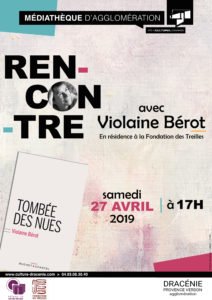
During her meeting with the public of the media library, Violaine Bérot, laureate of the 2019 Author’s residency Prize, addressed the theme of her latest work: denial of pregnancy. Fallen from the clouds tells of a birth by surprise, by breaking and entering. One snowstorm night, alone in her bathroom, a woman gives birth to a child. But is it conceivable to give birth when you are not aware of being pregnant ? Through a play of crossed voices, Violaine Bérot tells us the story of a puzzling motherhood.
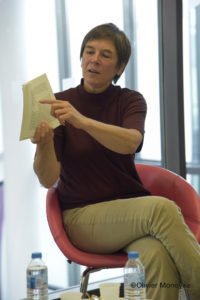
“That this baby allowed himself to enter inside me without my permission was intolerable to me, I did not accept the violence with which he had forced himself into my body, I could not bear this intrusion, this “defilement”, but to whom could I have told that … “
The author has worked a lot on form, rhythm, and added a specificity to her writing game: the absence of a point. This contributes to making the plot even more breathtaking. The book can also be read on several levels. The voices of the characters fit together in a puzzle of numbered paragraphs that can be read in two different orders.
“We admire the skill of the novelist Violaine Bérot, who has succeeded in making silent mountain dwellers speak and in orchestrating their beautiful solitary personalities. » Astrid de Larminat. Le Figaro littéraire.
The Fondation des Treilles meetings at the Sauroy hotel
From May 11 to 20, 2018, the Foundation organized at the Hôtel de Sauroy (Paris) an exhibition of the winners of the Photography Prize and round tables presenting all of its activities, ranging from the organization of seminars and residential studies devoted to research in all fields of knowledge, actions or meetings for educational purposes, hosting writers and photographers in residence, training young singers with the Voice Academy, to promoting the collection of works of art bequeathed by the founder.
Louis Philippe Dalembert
The meeting with the author Louis-Philippe Dalembert, laureate of the 2018 Author’s Residency Prize took place in March 2018. He spoke about the reasons that pushed him for writing his book Before the shadows fade away, in which he tells the story of a young man coming from a Polish Jewish family during World War II and his exile in Haiti.
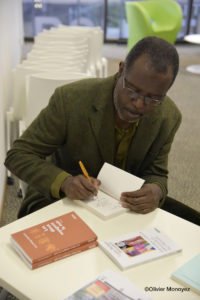
In the prologue to this saga leading the protagonist from Poland to Port-au-Prince, the author recalls the vote by the Haitian state, in 1939, of a decree-law authorizing its consulates to issue passports and safe conducts to all Jews who requested it, thus allowing them to escape Nazism.
Thanks to this decree, before his arrival in Port-au-Prince, Doctor Ruben Schwarzberg was one of those whose path had been broken by Nazism. Having become a renowned physician and the patriarch of three generations of Haitians, he had left his past behind. But, when Haiti was hit by the earthquake in January 2010 and among doctors coming from all around the world, his little cousin Deborah rushed from Israel, he agreed to reconsider his story. His book won the France Bleu-Bookstore Page prize in 2017, and the Orange book prize in 2017.
Michaël Ferrier
Michaël Ferrier, laureate of the 2018 Author’s Residency Prize, came to meet the public in the fall of 2018 to talk about his novel François, portrait of an absent.
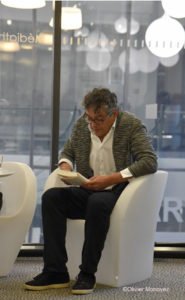
A blank voice, appearing in the middle of the night, announced to Michael the death of his friend François and his daughter Bahia, both brutally swept away by a villainous wave on a small island in the Canaries. To exorcise the pain, the author decides to write down the story of their friendship, and gives us a portrait full of tenderness of his childhood friend.
We discover Francois’ life, who began his career as a film director and finally joined the world of radio. Michaël recounts with nostalgia their memories from high school, the discovery of Japan, where he now lives, the endless debates and discussions of two friends who were passionate about music, cinema and radio. He evokes their good times, but also quite unexpectedly, their argument : their “quarrel”.
“How to talk about the disappeared? Indeed, by writing what never has the weight of a “tomb”, Ferrier also questions literature, and how words can bring this exceptional and beautiful friendship to life. ” Le Point.
Olivier Dhénin
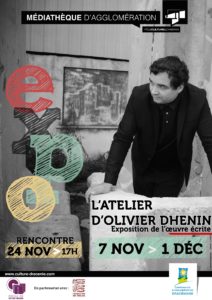
This literary encounter is part of a plural journey: an exhibition and a reading. Both poet and director, Olivier Dhénin, laureate of the 2018 Author’s Residency Prize, is the first playwright received as part of the Treilles writing residencies. During his stay he worked on the writing of Waldstein, the third installment of his Trilogy : The Ordeal, which follows in the dramatic lineage of the Greek Tragics.
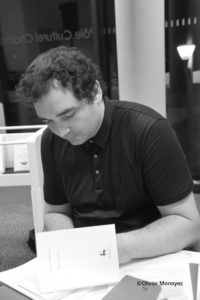
Presented alongside his writing residency, Olivier Dhénin’s workshop exposed the poet’s artistic connections, the playwright’s intimate links with painting, music, photography and literature. In this artist’s studio, different sources of inspiration, works and their transformations in contact with other artists were developed.
How the poem becomes music thanks to the composer, how the words are transformed into colors thanks to the painter and the photographer; how an old novel, a film scene, a painting are revealed as a source of inspiration that generates the writer’s work. The exhibition brought together a collection of unpublished documents: manuscripts revealing the genesis and labour of his writing, musical scores and artist books that constitute the poet’s constellation. This workshop fits into Anne Gruner Schlumberger’s approach, who wanted the different arts to meet.
Wiktoria Wojciechowska
n 2017, the Draguignan theater exhibited the work of Wiktoria Wojciechowska, winner of the 2015 Photography Prize. With her series Sparks on the war in Ukraine, consisting of portraits of young men who became soldiers and who joined the front, she tries to show the traces of war on the faces and in the eyes of young combatants.
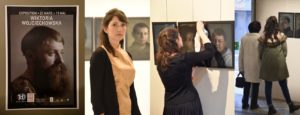
Hicham Gardaf
Hicham Gardaf has also exhibited at the Draguignan theater. He is a Moroccan photographer who lives between Tangier and London and works on the representation of the major changes that Morocco is experiencing nowadays. He won the 2014 Photography Prize. His project for Les Treilles is a description of the great urban, socio-cultural transformations, and it addresses the question of Western modern society’s identity and vision in the Arab world.
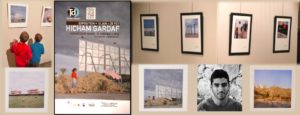
Raed Bawayah
Winner of the 2011 Photography Prize, Raed Bawayah lived a story worthy of a film script. At the age of ten he began to work as a fruit picker on an Israeli farm, and then sold grapes in the streets of Jerusalem. It was by observing the tourists strafing the Holy City that his passion for photography began. At 28, against all odds, he joined an Israeli art school, the Naggar School, and went there illegally every morning to take photography lessons. He is today a recognized professional.
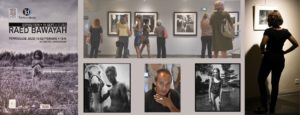
Through his various black and white series, he constantly questions exclusion, isolation, normality and finally the place of human beings. Whether it is with children from his village, Palestinian workers forced into exile in Israel, patients at the psychiatric hospital in Beethlehem, or even gypsy communities in France and homeless people in Germany, Raed always operates with a “inside” approach. He then produces a realistic and objective photographic work, preserving modesty, compassion and respect, devoid of any miserabilism.


